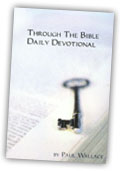10/6
Psalms 32:1-2,5
1Blessed is he whose transgressions are forgiven, whose sins are covered. 2Blessed is the man whose sin the LORD does not count against him and in whose spirit is no deceit.
5Then I acknowledged my sin to you and did not cover up my iniquity. I said, "I will confess my transgressions to the LORD"ŌĆō and you forgave the guilt of my sin. Selah
In the Old Testament there were laws that governed the rituals of dealing with sin. The sacrifices and offerings that were prescribed were a picture of Christ who would become the sacrifice in our place. Though the people of Israel followed the instructions given, some of them knew that it was impossible for the blood of bulls and goats to wash away sin. They knew the sacrifice was important, but they also knew it didn't change them.
In this psalm David tells of the blessing on the man whose sin is covered. Guilt is a heavy load. As he kept silent, trying to hide his sin, he said he felt the heavy hand of God upon him, causing his bones to feel old. Quite a description of guilt! How did David find relief? He ended his silence.
In the New Testament we find that we are to confess our faults one to another so that we can pray for each other (James 5:16). Our old nature tells us to keep silent, but that just makes it worse. Once it is out in the light, we can deal with it and truly forsake it. As long as we hide it, we entertain thoughts of continuing in that evil pattern. But when we decide it is destroying us and needs to be forsaken, we bring it out by confession. Then we can ask for forgiveness and find that wonderful blessing David was speaking of. Is there a secret sin you are hiding in the darkness? Hold it up and examine it in the light of the cross where God's love is displayed for you. Ask yourself if that sin compares in value to His love. Bring it into the light, confess it to God, and if necessary, if it still haunts you, confess it to a mature saint you can confide in.
Remember: Sin loses power when it is brought into the light.








